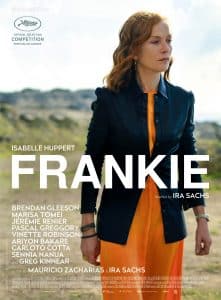
Frankie
Frankie is a famous actress with a large extended family: a companion with a married daughter, a son had by a former husband who belatedly discovered her homosexuality, an acquired granddaughter. With characteristic determination, the one that makes her believe she can control everything and everyone, Frankie calls the family together for a vacation in the historic Portuguese town of Sintra. But the opportunity is sad: the matriarch is about to die, and this is her way of bringing together all the affections before the farewell.
Frankie is in a hurry because she knows she has little time in front and must prepare not only herself but also her loved ones for the acceptance of a marked destiny. But he hates fading and sentimentality, he doesn’t want to see anyone crying, he can’t stand “shit and cazzari” and ironically confronts his condition.
Isabelle Huppert, now accustomed to interpreting characters so central as to give the title to the films, makes this tough but not anaffective, witty and never banal woman credible.
Her image of an unconventional and totally uninterested woman in what others think of her flows seamlessly into this umpteenth “Huppert” interpretation and it is Frankie’s strength, combined with her acting strength, that is her strength.
Ira Sachs, former director of I toni dell’amore and Keep The Lights On, is inclined to talk about complex family relationships and chooses choral casts, but here she opens up the field from New York to the Old Continent, bringing together an English, Irish, French and American. The inspiration is clearly Rohmerian, but of Rohmer there is only one, and it is even more difficult for an American director to invent “European” and aspire to the lightness of Pauline’s author at the beach or Claire’s knee.








